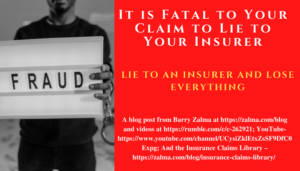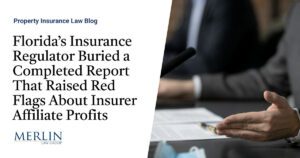It is Fatal to Your Claim to Lie to Your Insurer

See the full video at https://rumble.com/vpfk7c-it-is-fatal-to-your-claim-to-lie-to-your-insurer.html and at https://youtu.be/_R3hItia8E4
 False swearing is a special category of misrepresentation or concealment because it is made under oath. In criminal law, false swearing is called perjury.
False swearing is a special category of misrepresentation or concealment because it is made under oath. In criminal law, false swearing is called perjury.
If there was any false swearing as to the property that was the subject of the insurance, it vitiated that policy; if there was false swearing as to the meat and corn, it vitiated the policy taken out upon those articles. The instruction, in effect, told the jury, that if they believed there was false swearing with respect to the meat and corn, the result would be to vitiate policy and that the plaintiff would not be entitled to recover the policy benefits. [Williams v. Va. State Ins. Co, 55 S.E. 680, 106 Va. 259 (1906)]
In order for a “false swearing” to void an insurance policy, the false swearing must have been willful, made with respect to a material matter, and made with the intent to deceive the insurer. [Gould v. M.F.A. Mutual Insurance Company, 331 S.W.2d 663, 669 (Mo.App.1960); Joiner v. Auto-Owners Mut. Ins. Co., 891 S.W.2d 479 (Mo. App. 1994)]
Where an insurance policy provides that an insured’s concealment, misrepresentation, fraud, or false swearing voids the policy, the insured must have actually intended to defraud the insurer. [West v. Farm Bureau Mutual Insurance Co. of Michigan, 402 Mich. 67, 259 N.W.2d 556 (1977)]
Under Michigan law, fraud must be proved by clear and convincing evidence, [Disner v. Westinghouse Electric Corp., 726 F.2d 1106, 1109-11 (6th Cir. 1984)], even when raised as an affirmative defense. Therefore, under Michigan law, the insured’s intent in making a misrepresentation in a proof of loss is a material fact because it is a falsely sworn statement. [Madkins v. State Farm Fire & Cas. (E.D. Mich., 2019)]
Mississippi has a different understanding when there is more than one part to an insurance policy. A policy insuring various items and fixing the amount of insurance to be paid on each, is separable, although the premium is fixed as an entirety; and that because the policy is void as to one item, that fact does not render it unenforceable as to the others. [Darden v. Liverpool & London & Globe Ins. Co., 109 Miss. 501, 68 So. 485; Scottish Union & National Ins. Co. v. Warren Gee Lumber Co., 118 Miss. 740, 80 So. 9, 12, and National Union Fire Ins. Co. v. Provine, 148 Miss. 659, 114 So. 730.]
On the other hand, in Michigan, even when viewed in a light most favorable to plaintiff, the evidence presented the trial court established that plaintiff’s claims for no-fault benefits were based upon fraud and false swearing. Reasonable minds could not differ that plaintiff engaged in fraud for the purpose of recovering no-fault benefits. Because she did so, Farm Bureau had the contractual right to void the policy and deny her no-fault benefits. [Parker v. Farm Bureau Gen. Ins. Co. (Mich. App., 2019)]
Under Oklahoma law, an insurer claiming that the insured violated a fraud and false swearing provision in an insurance policy must prove it by “a fair preponderance of the evidence” and not “clear and convincing evidence” required in other states. [Transp. Ins. Co. v. Hamilton, 316 F.2d 294, 296 (10th Cir. 1963); Century Sur. Co. v. Shayona Inv., LLC, 840 F.3d 1175 (10th Cir., 2016)]
A concealment and fraud provision of an insurance policy makes clear that the general rule of insurance law requiring good faith and fair dealing applies to fraudulent statements and false swearing made by an assured after a loss. [Domagalski v Springfield Fire & Mar. Ins. Co., 218 App Div 187, 189 [1926]). This provision is breached if an insured tenders a fraudulent proof of loss as the basis for a recovery under the policy. [Saks & Co. v Continental Ins. Co., 23 NY2d 161, 165 [1968]; Kantor Silk Mills, Inc. v Century Ins. Co., Ltd., 253 NY 584 [1930]) and Gray v. Tri-State Consumer Ins. Co., 2015 NY Slip Op 32522(U) (N.Y. Sup. Ct., 2015)]
In Mutual of Enumclaw v. Cox, 757 P. 2d 499 (1988), the Washington Supreme Court was asked to interpret a homeowners policy that stated the entire policy would be void if “There has been fraud or false swearing.” Even though the insured’s fraud involved only his unscheduled personal property, the court held that the entire policy was void and the insured was not entitled to any recovery. This appears to be the majority position that one cannot commit a little fraud any more than one can be a little dead.
An insured’s ulterior motive in misrepresenting material facts to the insurer is irrelevant in determining whether a fraud and concealment provision provides a defense to the insured’s claim. In the following case, the insured presented a fraudulent vandalism claim for damage caused intentionally by her son. The insured felt compelled to lie as she had been threatened with physical injury by her son, who had a previous conviction for violent behavior, and who had caused the damage. The California Court of Appeal stated:
First, plaintiff admits that she knew she was lying to the defendant and did so with the intent that defendant not find out the actual facts. Second, under Claflin, the intent to defraud the insurer is necessarily implied when the misrepresentation is material and the insured willfully makes it with knowledge of its falsity. Thus, plaintiff’s intent to deceive was established as a matter of law Cummings v. Farmers Ins. Exchange, 202 Cal. App. 3d 1407, 249 Cal. Rptr. 568 (Cal. App. 2 Dist. 1988). (Emphasis added.)
This conclusion is in no way avoided by the plaintiff’s contention that the motivation for the false statements was her very reasonable fear of her son. As expressed by the US Supreme Court in Claflin, an insured’s ulterior motive in misrepresenting material facts to the insurer is irrelevant. In the context of the Cummings case, the plaintiff’s motive of fear of her son’s violence was irrelevant to the question of whether she intended to deceive the insurer. Cummings, supra.
If Mrs. Cummings’ son was her spouse or an insured of the policy, she may have recovered half of the loss had she not lied about the actions of the insured who caused the damage. It is not fraud to negligently damage property and admit your negligence. It is also not fraud if, in a fit of insanity, an insured destroys the property and, with the aid of pharmaceuticals, comes back into control and admits what was done while incompetent. It is the lie that gets the insured into trouble with special investigative unit (SIU) investigators and the courts.
In Texas and Oklahoma, false swearing is explained this way: “Where an insured knowingly and willfully overestimates the value of property destroyed or damaged, the policy is voided and the insured’s right to recover is defeated.” [Summit Machine Tool Manufacturing Corp. v. Great Northern Insurance Co., 997 S.W.2d 840 (Tex. App. Dist. 3, 1999)].
The Mississippi Supreme Court explained the reason for the “false swearing” defense that “[i]t would be unjust to allow a claimant to misrepresent facts which might lead to a valid defense and then to allow him to escape the consequences of the falsehood simply because he had succeeded so well that the company was unable to establish the defense,” Edmiston v. Schellenger, 343 So. 2d 465, 467 (Miss. 1977), cited with approval in Duke v. Hartford Fire Insurance Co., 617 F.2d 509, 510 (8th Cir. 1980) (per curiam) (applying Arkansas law).
In North Carolina, the Court of Appeal recognized that:
It is a basic principle of insurance law that the insurer may avoid his obligation under the insurance contract by a showing that the insured made representations in his application that were material and false. Pittman v. First Protection Life Insurance Co., 72 N.C. App. 428, 433, 325 S.E. 2d 287, 291 (1985).
Misrepresentations on an insurance application are material if the knowledge or ignorance of it would naturally influence the judgment of the insurer in making the contract and accepting the risk. [Bryant v. Nationwide Mut. Fire Ins. Co., 67 N.C. App. 616, 621, 313 S.E.2d 803, 807 (1984), Revd On Other Grounds, 313 N.C. 362, 329 S.E.2d 333 (1985).]
In order to void the policy pursuant to G.S. 58-44-15, defendant must show that the insured made statements that were:
false;
knowingly and willfully made; and
[Bryant v. Nationwide Mut. Fire Ins. Co., 313 N.C. 362, 370, 329 S.E. 2d 333, 338 (1985). Bell v. Nationwide Insurance Co., No. COA00-1464 (N.C. App., 11/06/2001).]
False swearing is a crime in all states if it amounts to perjury. If it does not amount to perjury it is still a defense to a false claim. To establish that an insured intended to deceive an insurer under Missouri law, the insurer must show that the insured:
knew the representation was false or did not know whether the representation was true or false, and
intended that the insurer rely on the representation.
In Young v Allstate Ins. Co 759 F.3d 836, 841 (8th Cir.2014) the Eighth Circuit, concluded that during an examination under oath, the Youngs admitted that the initial inventory listed many items that were not damaged or destroyed in the fire. They gave various explanations for the discrepancies. The Youngs both denied that they had intentionally overstated the claim to Allstate. The district court granted summary judgment for Allstate on the ground that the Youngs, by signing the initial inventory, were deemed to have knowledge of its contents, and that “no reasonable juror could conclude that [the Youngs] did not materially misrepresent their property claim.
An insurer can assert false swearing as an affirmative defense to an action brought by an insured. To constitute such a defense, the false statement must have been made under oath with the knowledge that it is false and with the intent that the person to whom the statement is made will rely on it. Actual reliance is not necessary.
In Parasco v Pacific Indemnity, 920 F. Supp. 647 (D.D. Pa., 1996), false swearing was important where the insurer suspected arson and denied the insureds’ fire loss claim. Although the insurer could not prove arson by the insureds, there was a legitimate question as to whether the fire was incendiary in nature. The insurer also had clear proof of misrepresentations made by the insureds under oath regarding, among other things, their active attempt to sell the property at the time of the fire. The court held that the materiality of false statements is to be determined at the time of investigation. The court further held that the insurer’s investigation into the insureds possible motive to commit arson was entirely reasonable and prudent, and inquiries into the insureds financial condition were, therefore, material to the issue of motive.
As both the proof of loss and the testimony at examination under oath are sworn to by the insured, any material falsehood is sufficient to establish the defense of false swearing. The same is true of any difference between the facts testified to during the examination under oath or stated in the proof of loss, and the facts developed from an audit of the insured’s books and records or an insurer’s investigation.
The U.S. Supreme Court stated the rule, as follows:
A false answer as to any matter of fact material to the inquiry, knowingly and willfully made, with an intent to deceive the insurer, would be fraudulent. If it accomplished its result, it would be a fraud effected; if failed, it would be a fraud attempted. No one can be permitted to say, in respect to his own statements upon a material matter, that he did not expect to be believed; their materiality, in the eye of the law, consists in their tendency to influence the conduct of the party who has an interest in them and to whom they are addressed. [Claflin v. Commonwealth Insurance Co., 110 U.S. 81, 3 S. Ct. 507, 28 l. ed. 76 (1884).]
Insurance is a business of utmost good faith. That means neither party to the contract of insurance may do anything to deprive the other of the benefits of the contract. Therefore, when an insured lies to the insurer to convince it to insure, or to convince it to pay more than is owed, he or she breaches the covenant of good faith and fair dealing and under the terms of the contract of insurance voids coverage. It’s not nice to lie to your insurer. It is fatal to any claim to lie to your insurer.

© 2021 – Barry Zalma
Barry Zalma, Esq., CFE, now limits his practice to service as an insurance consultant specializing in insurance coverage, insurance claims handling, insurance bad faith and insurance fraud almost equally for insurers and policyholders.
He also serves as an arbitrator or mediator for insurance related disputes. He practiced law in California for more than 44 years as an insurance coverage and claims handling lawyer and more than 54 years in the insurance business.
Subscribe to Excellence in Claims Handling at https://barryzalma.substack.com/welcome.
He is available at http://www.zalma.com and zalma@zalma.com. Mr. Zalma is the first recipient of the first annual Claims Magazine/ACE Legend Award. Over the last 53 years Barry Zalma has dedicated his life to insurance, insurance claims and the need to defeat insurance fraud. He has created the following library of books and other materials to make it possible for insurers and their claims staff to become insurance claims professionals.
Go to training available at https://claimschool.com; articles at https://zalma.substack.com, the podcast Zalma On Insurance at https://anchor.fm/barry-zalma; Follow Mr. Zalma on Twitter at https://twitter.com/bzalma; Go to Barry Zalma videos at https://www.rumble.com/zalma ; Go to Barry Zalma on YouTube- https://www.youtube.com/channel/UCysiZklEtxZsSF9DfC0Expg; Go to the Insurance Claims Library – https://zalma.com/blog/insurance-claims-library/ The last two issues of ZIFL are available at https://zalma.com/zalmas-insurance-fraud-letter-2/ podcast now available at https://podcasts.apple.com/us/podcast/zalma-on-insurance/id1509583809?uo=4
Like this:
Loading…
Related




